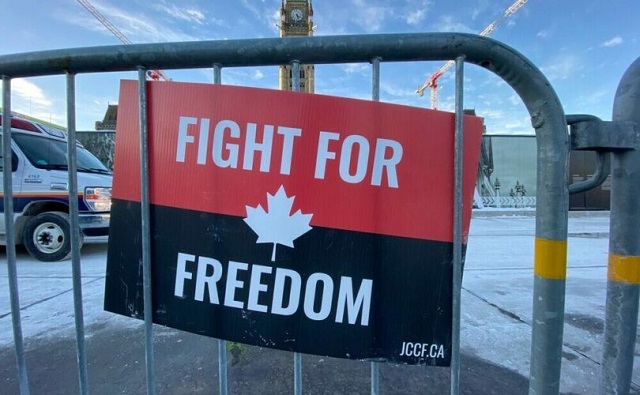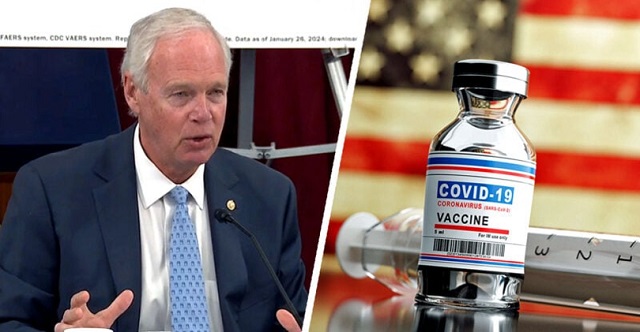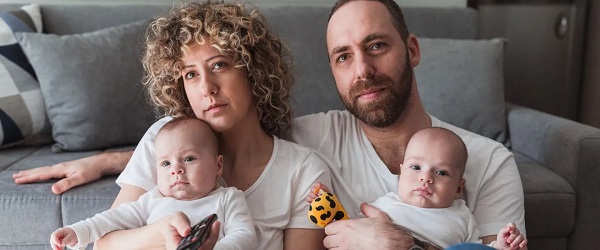COVID-19
Canadian veteran on trial for trying to guard war memorial during Freedom Convoy

From LifeSiteNews
Canadian Armed Forces veteran Jeff Evely was on his way for his shift standing guard at the War Memorial when he was arrested by police for entering a closed off area at the 2022 Freedom Convoy.
A Canadian Armed Forces (CAF) veteran is on trial for mischief and obstruction charges after he was forcibly detained at the 2022 Freedom Convoy.
According to a press release from the Justice Centre for Constitutional Freedoms (JCCF), the trial for CAF veteran Jeff Evely continued Tuesday. Evely is charged with mischief and obstructing police. He was arrested while on his way to guard the Ottawa War Memorial during the 2022 Freedom Convoy.
“The actions of the Ottawa police in locking down downtown Ottawa and preventing all civilians from accessing public areas greatly exceeded their powers under the common law,” JCCF lawyer Chris Fleury said of the case.
“Mr. Evely’s arrest for simply being inside of the locked down area was arbitrary,” he insisted.
According to the JCCF press release, when the convoy first came to Ottawa, allegations were floated that the memorial had been desecrated. After learning of this, Evely quickly organized a group of veterans to stand guard around the clock to protect the area.
However, under Prime Minister Justin Trudeau’s use of the Emergencies Act, many parts of downtown Ottawa were blocked to the public, and a vigilant police force roamed the streets.
It was during this time that Evely was arrested for entering a closed off section of downtown Ottawa during the early hours of February 19, 2022. He had been on his way to take the 4:25 a.m. shift protecting the Ottawa War Memorial.
As Evely walked to the memorial, he was allegedly told to stop by police. According to the police, Evely “ran for a short distance before being confronted by two additional police officers.”
He was forcibly pushed to the ground, landing face first. The veteran was then arrested and charged with mischief and obstructing police.
At the time, the use of the EA was justified by claims that the protest was “violent,” a claim that has still gone unsubstantiated.
In fact, videos of the protest against COVID regulations and vaccine mandates show Canadians from across the country gathering outside Parliament engaged in dancing, street hockey, and other family-friendly activities.
Indeed, the only acts of violence caught on video were carried out against the protesters after the Trudeau government directed police to end the protest. One such video showed an elderly women being trampled by a police horse.
While the officers’ actions were originally sanctioned under the EA, Federal Court Justice Richard Mosley ruled that Trudeau was “not justified” in invoking the EA, forcing Crown prosecutors to adopt a different strategy.
Now, Crown prosecutors allege that the common law granted police the authority to stop and detain Evely, regardless of the EA.
However, Evely and his lawyers have challenged this argument under section 9 of the Canadian Charter of Rights and Freedoms, insisting that his “arrest and detention were arbitrary.”
Evely is hardly the only Canadian to be facing charges following the Freedom Convoy. Earlier this month, two men linked to the 2022 Freedom Convoy-inspired border blockade protest in Coutts, Alberta, Anthony Olienick and Chris Carbert, were acquitted of charges of conspiracy to commit murder, but not before being jailed and denied bail for over two years.
COVID-19
Senator Demands Docs After ‘Blockbuster’ FDA Memo Links Child Deaths To COVID Vaccine


From the Daily Caller News Foundation
By Emily Kopp
The letter, exclusively shared with the Daily Caller News Foundation, seeks more details about those deaths and the passive U.S. vaccine safety surveillance system and complacent Food and Drug Administration (FDA) bureaucracy under the Biden administration that delayed their reporting for years.
“Nobody wanted to admit that these things were causing death. This is absolutely a case of willful ignorance,” Johnson said in an interview with the DCNF.
As a nonprofit, we are dependent on the generosity of our readers.
Please consider making a small donation of any amount here.
Thank you!
The letter requests from the Department of Health and Human Services (HHS) “all records referring or relating to the review of the 96 reports of death following a COVID-19 vaccine … including but not limited to, any memorandum or report created following that review and the data underlying the reports.”
“I am grateful that we now have individuals at our federal health agencies who care about vaccine safety and efficacy. I am, however, disappointed that despite having subpoenaed HHS for the type of data and information described in Dr. Prasad’s memo, it does not appear to have been provided to my office,” the letter reads.
HHS did not immediately respond to a request for comment.
“This is a profound revelation. For the first time, the US FDA will acknowledge that COVID-19 vaccines have killed American children. Healthy young children who faced tremendously low risk of death were coerced, at the behest of the Biden administration, via school and work mandates, to receive a vaccine that could result in death. In many cases, such mandates were harmful. It is difficult to read cases where kids aged 7 to 16 may be dead as a result of covid vaccines,” Prasad wrote. “There is no doubt that without this FDA commissioner [Marty Makary], we would not have performed this investigation and identified this safety concern. This fact also demands serious introspection and reform.”
“One reason I’m writing this letter is that this memo needs much greater attention. This should be a blockbuster,” the Wisconsin senator told the DCNF.
Johnson, who has investigated the issue of COVID vaccine-linked adverse events since June 2021, also seeks more clarity about why FDA only examined a fraction of total reports to the Vaccine Adverse Event Reporting System (VAERS). He noted that the 96 deaths scrutinized by FDA staff in its investigation represents a sliver of the raw VAERS reports of 9,299 deaths worldwide within two days of vaccination.
Distinguishing which VAERS reports indicate genuine fatal side effects and which represent mere coincidences requires autopsy reports, which regulators and physicians often do not request because of a ideological reluctance to acknowledge that vaccines can carry risks, Johnson told the DCNF. Johnson said he has spoken to families who suspected a vaccine injury but struggled to obtain autopsies.
“With some of these officials at federal health agencies and within the medical establishment, vaccines are religion. The do not want to muddy the water with facts,” he said.
Johnson’s letter notes that Prasad acknowledged a culture at FDA “where vaccines are exculpated rather than indicted in cases of ambiguity,” and that the true number of deaths is likely higher.
Johnson has as chair of the Senate Permanent Subcommittee on Investigations investigated the Biden administration’s headlong expansion of COVID vaccines and booster shots to healthy young adults and children.
His committee uncovered internal federal documents showing the Centers for Disease Control and Prevention never updated its vaccine surveillance tool “V-Safe” to include cardiac symptoms, despite naming myocarditis as a potential adverse event by October 2020, per a May report. The investigation also found that top officials at FDA obstructed a warning to pediatricians and other providers about the risk of myocarditis after the May 2021 authorization of the Pfizer vaccine for 12 to 15-year-olds, months after Israeli health officials first detected the safety signal in February 2021.
Johnson’s letter highlights missing safety studies that the drugmakers never conducted.
Under the Biden administration, the FDA waived the responsibility of the drugmakers to conduct post-market studies that they had pledged to regulators, scientific advisors on the FDA Vaccines and Related Products Advisory Committee, and the public that they would complete. These uncompleted studies include promised research into subclinical myocarditis, undocumented rates of heart inflammation without obvious symptoms, Prasad’s memo states.
Johnson’s letter reveals the committee has not received any records from HHS about the liability shield for COVID-19 vaccines.
A public health media personality reported on Dec. 11 that FDA staff had downgraded the certainty with which it can attribute some the deaths to the vaccine in the weeks since Prasad received their top line results — echoing prior leaks from career officials aimed at undermining FDA’s new bosses.
Center for Drug Evaluation and Research Acting Director Tracy Beth Hoeg first concluded in a separate analysis that there were in fact deaths in children in the summer, but career staff leaked the results to reporters who “portrayed the incident as Dr. Hoeg attempting to create a false fear regarding vaccines” soon after, per Prasad’s memo.
Johnson’s letter seeks documentation of Hoeg’s meeting, including “a list of all attendees.”
COVID-19
China Retaliates Against Missouri With $50 Billion Lawsuit In Escalating Covid Battle


From the Daily Caller News Foundation
China is escalating its legal fight with Missouri after the state secured a massive court victory earlier this year over Beijing’s role in the COVID-19 pandemic, according to the state attorney general’s office.
Missouri Attorney General Catherine Hanaway announced Tuesday that the People’s Government of Wuhan Municipality, the Chinese Academy of Sciences and the Wuhan Institute of Virology have filed a $50 billion lawsuit against the state, claiming Missouri poses an “economic and reputational threat” to the People’s Republic of China (PRC). The suit comes as Missouri moves to seize Chinese-owned assets to collect on a historic federal court judgment the state won in March.
Missouri first sued China in 2020, seeking $25 billion in damages “for causing and exacerbating the COVID-19 pandemic” and for hoarding critical medical supplies while the virus spread, according to the state attorney general’s office. China and several affiliated entities were ordered to pay Missouri roughly $24.49 billion, plus post-judgment interest. Senior U.S. District Judge Stephen Limbaugh ruled that China and the other defendants “failed to appear or otherwise answer after being properly served,” resulting in the default judgment.
As a nonprofit, we are dependent on the generosity of our readers.
Please consider making a small donation of any amount here.
Thank you!
Missouri maintained that China was attempting to shield itself from legal consequences by relying on proxy organizations to speak on its behalf — an accusation Beijing now disputes in its own lawsuit against the state.
In its lawsuit, China alleges that Missouri’s actions have had “negative effects on the soft power” of Wuhan and have “belittled the social evaluation” as well as adversely affected the “productivity and commercialization of scientific and technological achievements” of the Chinese Academy of Sciences and the Wuhan Institute of Virology. The filing further alleges that Missouri’s “vexatious litigation” has “defamed Plaintiffs’ reputation, resulting in huge economic losses of the Plaintiffs, and deeply endangering sovereignty, security and development interests of China.”
The suit names the state of Missouri, Republican Missouri Sen. Eric Schmitt and the former Missouri Attorney General Andrew Bailey as the defendants.
China’s lawsuit demands the defendants “issue public apologies on New York Times, CNN, Wall Street Journal, Washington Post, YouTube and other American media or internet platforms, and People’s Daily, Xinhuanet and other Chinese media or internet platforms.”
Hanaway rejected the demand and said the state remains focused on enforcing the federal judgment.
“I find it extremely telling that the Chinese blame our great state for ‘belittling the social evaluation’ of The Wuhan Institute of Virology. This lawsuit is a stalling tactic and tells me that we have been on the right side of this issue all along,” Hanaway said in a statement. “We stand undeterred in our mission to collect on our $24 billion judgment that was lawfully handed down in federal court.”
Schmitt described China’s suit as “frivolous lawfare, attempting to absolve themselves of all wrongdoing in the early days of the pandemic.”
“This is their way of distracting from what the world already knows, China has blood on its hands. China lied about the origins of COVID virus, they tried to cover it up, and they upended the world by creating a global pandemic that resulted in immense human loss,” Schmitt added.
Missouri, Hanaway said, is continuing efforts to obtain certification that would allow the state to seize Chinese-owned assets, including real estate, financial interests, and other holdings tied to the defendants.
-

 Community2 days ago
Community2 days agoCharitable giving on the decline in Canada
-

 Business1 day ago
Business1 day agoCanada’s recent economic growth performance has been awful
-

 Alberta1 day ago
Alberta1 day agoCanada’s New Green Deal
-

 armed forces1 day ago
armed forces1 day agoOttawa’s Newly Released Defence Plan Crosses a Dangerous Line
-

 Alberta1 day ago
Alberta1 day agoAlberta’s huge oil sands reserves dwarf U.S. shale
-

 Health1 day ago
Health1 day agoSaskatchewan woman approved for euthanasia urged to seek medical help in Canada rather than US
-

 Business1 day ago
Business1 day agoCOP30 finally admits what resource workers already knew: prosperity and lower emissions must go hand in hand
-

 Daily Caller1 day ago
Daily Caller1 day agoParis Climate Deal Now Decade-Old Disaster






